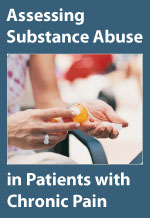“Pain is perfect misery, the worse of all evils; and excessive, overturns all patients.” John Milton, Paradise Lost
Chronic pain refers to pain that lasts longer than would be expected for a particular injury, disease, or syndrome. In some cases, the cause of chronic pain cannot be satisfactorily treated or removed. Estimates by the American Chronic Pain Association (ACPA) project that one-third of Americans suffer from some type of chronic pain condition. Furthermore, chronic pain is credited with being the primary cause of disability in this country.
Despite the prevalence of chronic pain as a public health issue, many mental health professionals have limited knowledge about the assessment and management of pain. Some clients, as well as clinicians, believe that use of narcotic pain medications to treat certain pain syndromes leads to addiction. This belief contradicts findings suggesting the actual risk of iatragenic addiction to opiate medication for pain patients is more likely to be less than one percent. However, fear of addiction may cause some individuals to endure inadequately treated pain and accept a significant loss of quality of life. Bostrom reported survey findings that ninety-two percent of respondents believe pain is a fact of life; that eighty-two percent believe it is too easy to become reliant on pain medication; that seventy- two percent believe that medication will not be effective with consistent use, and that forty-six percent avoid medication until pain becomes unbearable. Accordingly, it is important for mental health practitioners to assess pain in their clients, understand actual risk factors for misuse of common drug therapies for pain, and identify appropriate interventions for pain management as a priority.
This 3-hour online continuing education (CE) course, Assessing Substance Abuse in Patients with Chronic Pain, will demystify the diagnosis and treatment of chronic pain, the role and limitations of pain medications, and how to identify when pain relieving drugs may be harmful to clients. Participants will understand how to conduct a complete evaluation of clients with a pain disorder, chronic pain syndrome and co-morbid psychiatric diagnoses. Although the majority of chronic pain patients do not abuse pain medications, mental health practitioners need skills to assess when active substance abuse is present and develop appropriate treatment objectives. This course will also give special attention to specific clinical challenges for mental health professionals who treat clients with chronic pain, including suicide assessment and treatment non-adherence.
“For all the happiness mankind can gain, is not in pleasure, but in rest from pain.” John Dryden (1631-1700)


